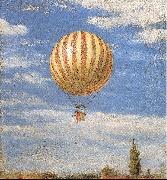Wholesale Oil Painting No Minimum |
|||||||||||
|
|
|||||||||||

|
|||||||||||
|
|
|
||||||||
Merse, Pal SzinyeiHungarian Painter, 1845-1920 was a Hungarian painter and politician. Born in Szinye??jfalu, Hungary (today Chminianska Nov?? Ves, Slovakia), he learned painting at the Academy of Fine Arts, Munich under Karl von Piloty. He was a friend of Wilhelm Leibl and Hans Makart. His are some of the earliest works of Impressionism in Hungary and Central Europe. At the 1873 World's Fair in Vienna he won a medal with his painting Bath House. Szinyei was also an active politician. He was elected to the parliament of Hungary where he fought for the modernization of art education. He died in February 2, 1920, just four month and two days before the Trianon treaty, in Jarovnice |
||||||||
|
|
||||||||
The Balloon
The Balloon Painting ID:: 19403 |
1878
Oil on canvas
The Hungarian National Gallery, Budapest.
1878 Oil on canvas The Hungarian National Gallery, Budapest. |
|||||||
|
|
||||||||
Merse, Pal SzinyeiHungarian Painter, 1845-1920 was a Hungarian painter and politician. Born in Szinye??jfalu, Hungary (today Chminianska Nov?? Ves, Slovakia), he learned painting at the Academy of Fine Arts, Munich under Karl von Piloty. He was a friend of Wilhelm Leibl and Hans Makart. His are some of the earliest works of Impressionism in Hungary and Central Europe. At the 1873 World's Fair in Vienna he won a medal with his painting Bath House. Szinyei was also an active politician. He was elected to the parliament of Hungary where he fought for the modernization of art education. He died in February 2, 1920, just four month and two days before the Trianon treaty, in Jarovnice |
||||||||
|
|
||||||||
|
|
The Balloon
The Balloon Painting ID:: 54386 |
mk235
1878
Oil on canvas
41.5x39cm
mk235 1878 Oil on canvas 41.5x39cm |
||||||
|
|
||||||||
Maurice PrendergastCanadian-born American Impressionist Painter, 1858-1924 American painter, printmaker, illustrator and designer of Canadian birth. He moved with his family to Boston in 1868 and was working as a commercial artist by 1886, lettering showcards, but his early attempts at watercolour foretold little of the talent that emerged after he travelled to Paris in January 1891. He studied for three years at the Atelier Colarossi under Gustave Courtois (1853-1923), and later at the Acad?mie Julian under Benjamin Constant, Joseph Blanc and Jean-Paul Laurens. |
||||||||
|
|
||||||||
|
|
The Balloon
The Balloon Painting ID:: 60150 |
The Balloon (1898)
The Balloon (1898) |
||||||
|
|
||||||||
|
Maurice Prendergast Canadian-born American Impressionist Painter, 1858-1924 American painter, printmaker, illustrator and designer of Canadian birth. He moved with his family to Boston in 1868 and was working as a commercial artist by 1886, lettering showcards, but his early attempts at watercolour foretold little of the talent that emerged after he travelled to Paris in January 1891. He studied for three years at the Atelier Colarossi under Gustave Courtois (1853-1923), and later at the Acad?mie Julian under Benjamin Constant, Joseph Blanc and Jean-Paul Laurens. The Balloon The Balloon (1898) |
||||||||
|
|
||||||||
|
Prev Next
|
||||||||
|
|
||||||||
|
Related Paintings to Maurice Prendergast :. |
||||||||
|
|
||||||||
|
CONTACT US |



